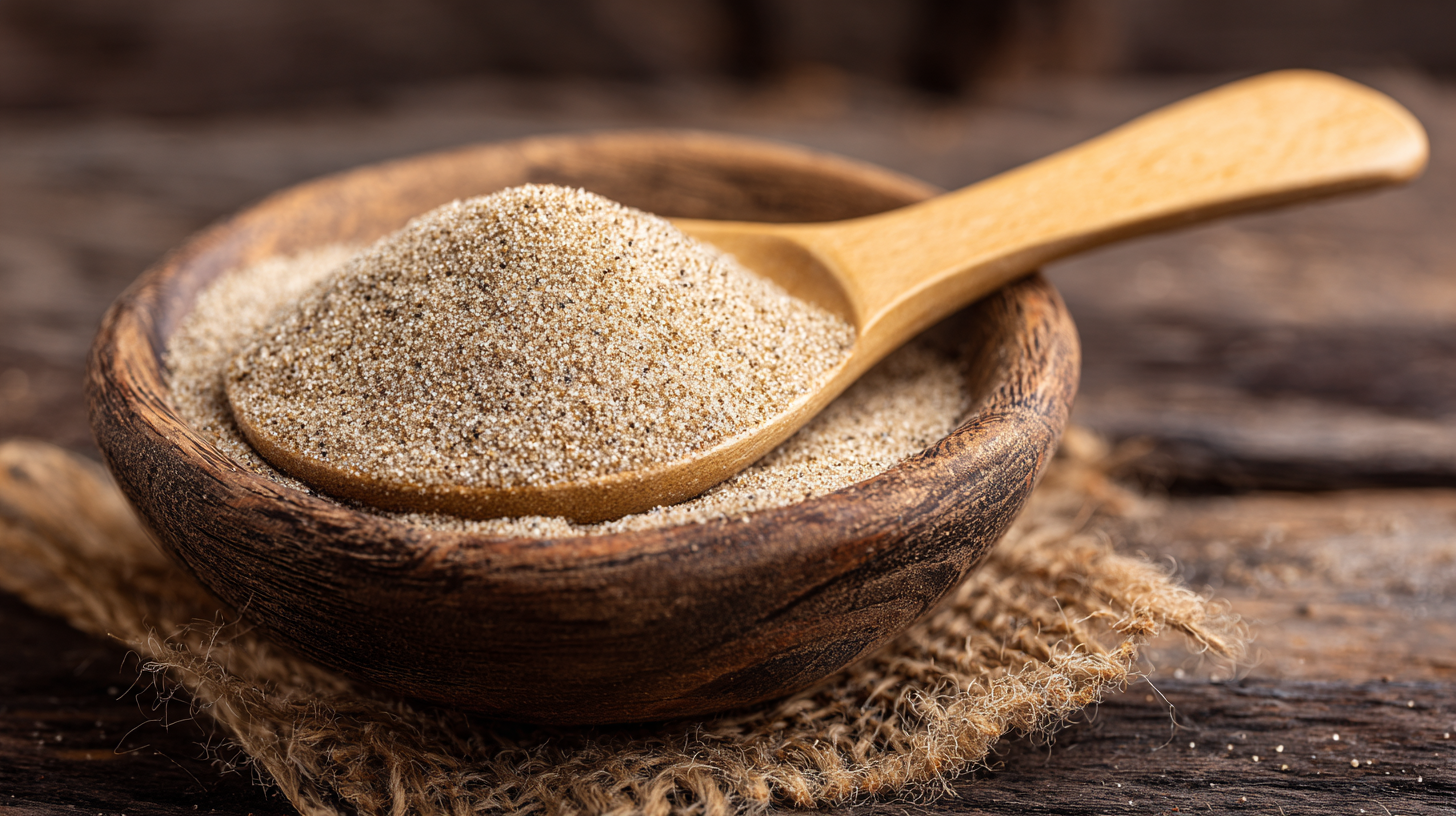Inquiry
Form loading...
In recent years, the significance of micronutrients in promoting optimal health and wellness has gained widespread recognition, with L-Selenomethionine emerging as a key player in this field. As a naturally occurring form of selenium, L-Selenomethionine is celebrated for its potent antioxidant properties and its role in supporting immune function, thyroid health, and overall metabolic processes. According to the National Institutes of Health, selenium deficiency can lead to various health issues, including compromised immune response and increased oxidative stress.

Furthermore, a study published in the Journal of Nutrition indicates that adequate selenium intake, particularly in the form of L-Selenomethionine, may contribute to reduced risks of chronic diseases such as cardiovascular disease and certain cancers. This ultimate guide delves into the multifaceted benefits and applications of L-Selenomethionine, offering insights on how to incorporate this powerful nutrient into your daily health regimen.
 L Selenomethionine is a powerful compound known for its significant role in supporting immune function. As we transition into colder seasons, maintaining a robust immune system becomes crucial. L Selenomethionine, a form of the essential mineral selenium, has antioxidant properties that help combat oxidative stress and inflammation, two key factors that can weaken immune responses. It aids in the production of selenoproteins, which are vital for proper immune function and can enhance the body's ability to fight off infections.
L Selenomethionine is a powerful compound known for its significant role in supporting immune function. As we transition into colder seasons, maintaining a robust immune system becomes crucial. L Selenomethionine, a form of the essential mineral selenium, has antioxidant properties that help combat oxidative stress and inflammation, two key factors that can weaken immune responses. It aids in the production of selenoproteins, which are vital for proper immune function and can enhance the body's ability to fight off infections.
Incorporating L Selenomethionine into your wellness routine may also complement dietary strategies to bolster immunity. Regular intake can be particularly beneficial during times when seasonal allergies or respiratory issues peak. Alongside a balanced diet rich in vitamins and minerals, L Selenomethionine can provide comprehensive support, allowing the body to better adapt to environmental changes. As awareness of immune health continues to grow, exploring the benefits of such supplements could prove essential for overall well-being.
L Selenomethionine is a powerful antioxidant that plays a crucial role in protecting our bodies from oxidative stress. As a naturally occurring form of selenium, it is essential for the proper functioning of various enzymatic systems that combat free radicals. According to the 2021 report by the World Health Organization, adequate selenium intake is linked to reduced risks of several chronic diseases, including heart disease and certain types of cancer. The body uses selenomethionine to maintain glutathione levels, a key player in the antioxidant defense system, thereby enhancing overall immune function.
To harness the benefits of L Selenomethionine, consider incorporating selenium-rich foods such as Brazil nuts, fish, and whole grains into your diet. If you're looking to supplement, opt for selenomethionine over other forms, as studies suggest it is better absorbed and utilized by the body.
Tips for maximizing antioxidant benefits include maintaining a balanced diet rich in vitamins C and E, which work synergistically with selenomethionine. Furthermore, regular exercise can significantly boost your body’s natural antioxidant capabilities. Keeping these strategies in mind can help you leverage the health benefits of L Selenomethionine effectively.
 L Selenomethionine is a vital selenium-containing amino acid that plays a significant role in maintaining thyroid health. The thyroid gland, responsible for regulating metabolism and hormone production, relies heavily on selenium for the enzymatic processes that convert thyroxine (T4) to the more active triiodothyronine (T3). Adequate selenium levels are crucial for the synthesis and metabolism of these hormones, making L Selenomethionine an essential nutrient for individuals aiming to support their thyroid function.
L Selenomethionine is a vital selenium-containing amino acid that plays a significant role in maintaining thyroid health. The thyroid gland, responsible for regulating metabolism and hormone production, relies heavily on selenium for the enzymatic processes that convert thyroxine (T4) to the more active triiodothyronine (T3). Adequate selenium levels are crucial for the synthesis and metabolism of these hormones, making L Selenomethionine an essential nutrient for individuals aiming to support their thyroid function.
Moreover, L Selenomethionine acts as a powerful antioxidant, helping to protect the thyroid from oxidative stress. This oxidative damage can impair thyroid function and has been implicated in various thyroid disorders. By combating free radicals, L Selenomethionine not only supports thyroid tissue integrity but also aids in the overall health and function of the gland. Regular supplementation of L Selenomethionine may therefore be a beneficial strategy for those looking to enhance their thyroid health and prevent potential dysfunction.
L Selenomethionine is an organic form of selenium that plays a crucial role in promoting cardiovascular wellness. Research from the American Journal of Clinical Nutrition highlights that adequate selenium intake can reduce the risk of heart disease by as much as 30%. This powerful antioxidant helps neutralize free radicals, which are known to contribute to oxidative stress and inflammation—both significant factors in cardiovascular issues. Moreover, L Selenomethionine supports the function of key enzymes that maintain heart health, helping to regulate blood pressure and improve overall circulation.
Tip: Incorporating L Selenomethionine into your diet can be as simple as enjoying foods rich in selenium, such as Brazil nuts, seafood, and whole grains. For individuals concerned about their selenium levels, consider discussing supplementation options with a healthcare provider to find the best approach tailored to your needs.
As we continue to uncover the benefits of L Selenomethionine, further studies indicate its role in managing cholesterol levels. A report published in the Journal of Nutrition found that individuals with optimal selenium levels exhibited lower LDL cholesterol and higher HDL cholesterol, significantly reducing cardiovascular risks. Including L Selenomethionine as part of a balanced diet not only supports heart health but also enhances overall well-being.
Tip: Regular check-ups and blood tests can help monitor your selenium levels, ensuring you maintain a healthy balance for optimal cardiovascular health.
Incorporating L Selenomethionine into your diet can yield significant health benefits, particularly as this compound serves as a potent antioxidant. Research indicates that selenium, a key component of L Selenomethionine, plays a critical role in regulating thyroid function and enhancing immune response. According to the National Institutes of Health, adequate selenium intake is associated with a reduced risk of chronic diseases, including certain cancers and cardiovascular conditions. Thus, incorporating this nutrient can support overall health.
Best practices for adding L Selenomethionine to your diet include both dietary sources and supplementation. Foods rich in selenium include Brazil nuts, fish, and poultry. A 2019 study published in the Journal of Nutrition found that regular consumption of these foods can help maintain optimal selenium levels. For those considering supplementation, a typical daily dose ranges from 100 to 200 micrograms, according to a review in the American Journal of Clinical Nutrition. It is essential to consult with a healthcare provider to tailor the dosage to individual health needs and ensure that it aligns with dietary preferences.
| Aspect | Details |
|---|---|
| Source | Natural occurring sulfur-containing amino acid in foods |
| Health Benefits | Antioxidant properties, supports thyroid function, boosts immunity |
| Recommended Daily Intake | 55 mcg for adults |
| Food Sources | Brazil nuts, fish, meat, eggs, and whole grains |
| Supplement Forms | Tablets, capsules, and powders |
| Usage Tips | Take with food to improve absorption, consult healthcare provider before use |






